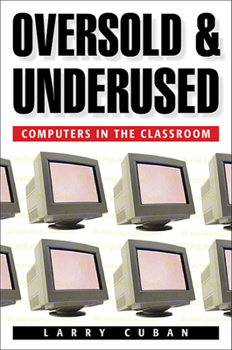Oversold and Underused: Computers in the Classroom
Select Format
Select Condition 
Book Overview
Impelled by a demand for increasing American strength in the new global economy, many educators, public officials, business leaders, and parents argue that school computers and Internet access will improve academic learning and prepare students for an information-based workplace.
Format:Paperback
Language:English
ISBN:0674011090
ISBN13:9780674011090
Release Date:April 2003
Publisher:Harvard University Press
Length:256 Pages
Weight:0.75 lbs.
Dimensions:0.7" x 5.5" x 8.2"
Customer Reviews
5 ratings
Every school should read
Published by Thriftbooks.com User , 21 years ago
Oversold and underused is a great read (informative and precise) for any school personel who are interested in learning more about what is happening or may happen with your technology money. Larry Cuban has provided great research that backs up his statements of how computers and technology are being underused in today's educational setting. If you think that the new technology revolution is going to reinvent our educational system, I suggest that you spend a few hours reading this book first.
A problem shared by the entire nation!
Published by Thriftbooks.com User , 21 years ago
As teachers, we all get frustrated with the limited technology in our schools. We have the equipment, but it isn't adequate for all of us to use. Larry Cuban explores this problem in great detail, offering an explanation as to why the billions of dollars spent across the nation on computers isn't improving academic performances. He also offers solutions as to what the nation needs to do to remedy this situation. A very thought provoking piece! If only our politicians would read it!
Oversold and Underused: Really?
Published by Thriftbooks.com User , 22 years ago
In this book, Larry Cuban details why he thinks a moratorium should be placed on all educational funds earmarked for technology. He methodically outlines the case studies of several Silicon Valley Schools. He points out that Silicon Valley, above all other places, should have been able to incorporate on a wide-spread basis technology-infused, student-centered teaching methodologies. Based on his studies, he predicts that not much will change in the near or far future as far as teaching is concerned. But he also offers suggestions as to how the desired changes in teaching might be realized. The book is interesting, well-written, and thought provoking. It may even be thought-provoking enough to facilitate the changes, he predicts will never happen.
Are Computers in Schools Worthwhile?
Published by Thriftbooks.com User , 22 years ago
School reform has a long history over the past two centuries. It is usual to blame schools and teachers for any current perceived failures. Those who condemn current educational practices also believe schools can make a better society, and are a solution for individual failures and larger social problems."Aside from the general lack of evidence concerning young children's experience using computers, there remains the pervasive belief among educators and parents about the inevitability of a future in which today's children will require technological competencies to succeed in the workplace. It is that belief, and not any research findings, that propels parents and educators to invest in preschools and computers" (p.65).The students who had substantial expertise with computers all gained their expertise outside of school, usually on home computers (p.91). That's because learning about a computer requires much more time than the hour or two a week available at school. The traditional method of teaching is for a knowledgeable person to lecture the students. This method dates back to ancient times: those who know, teach. "In the schools we studied, we found no clear and substantial evidence of students increasing their academic achievement as a result of using information technologies" (p.133)."Are teeachers' responses to computers similar to earlier technologies?" Films, radio, and television showed no improvement over conventional practices; they also had logistical problems. This "unexpected outcome" resulted in blaming teachers, not poorly designed hardware and software and the political organizational structure. Pages 144 and 148 tell of real-world experiences.Why was so much money pumped into schools in the 1990s? Was it a political decision to create markets and use up tax dollars? Page 157 says critics blamed schools for America's loss of global markets (!!!), which imagines some lost golden age. Page 158 tells of public opinion polls, which may only regurgitate the propaganda previously swallowed. Purchasing hardware and software or wiring schools were symbolic political gestures as much as attempts to acquire the right tools, even with little evidence that information technologies raise test scores or promote better teaching. Pages 159-166 give a short history of schooling since the late 19th century, and current practice. Page 168 gives a check-list on rating hardware and software for schools.Chapter Six summarizes the book and should be read by everyone who is interested in this subject. Computers in classrooms have NOT led to higher teacher and student productivity, or transformed teaching and learning; they are oversold and underused.
Very good book for teacher.
Published by Thriftbooks.com User , 23 years ago
I am Korean teacher at elementary school.I think this book is a good book to understandbetween theory and practice. It have enough value to share lots of teaching skill and give to teacherslots of fresh impression.





